Hedgehog Mushroom / Summer / Autumn / Edible
Welcome to a world of culinary delight as we embark on a journey to discover the flavoursome treasures of the Hedgehog Mushroom (Hydnum repandum).
Join us on this adventure where gastronomy meets nature’s bounty. With its distinct spiky underside and earthy charm, the Hedgehog Mushroom stands as a delightful edible gem.
Learn to identify its unique features, discover its preferred habitats, and delve into the culinary wonders it offers. From its tender texture to its delicate, nutty flavour, this mushroom has the power to elevate your culinary creations to delectable heights.
Whether you are an experienced forager or a curious home cook, let the Hedgehog Mushroom inspire your culinary explorations and tantalise your taste buds with its marvellous flavours. Embrace the abundance of nature’s gifts as we celebrate the enchanting delights that lie within the Hedgehog Mushroom. Get ready to embark on a flavour-filled journey as we discover the captivating culinary possibilities offered by this remarkable fungus.
Common Names
Hedgehog mushroom, Wood hedgehog, Sweet Tooth, Pied-de-Mouton
Scientific Name
Hydnum Repandum
Family
Hydnaceae
Habitat
Growing in arcs or rings in any type of woodland.
Description
A safe, easy to identify mushroom for beginners. If it’s light brown in colour, growing on the forest floor with a stem and if it has spines instead of gills, it’s a hedgehog mushroom.
Identifying Features of the Hedgehog Mushroom:
Cap:
Light brown to cream in colour, the cap is uneven and convex sometimes with a depression. The flesh is thick, white and stains slightly orange with age.
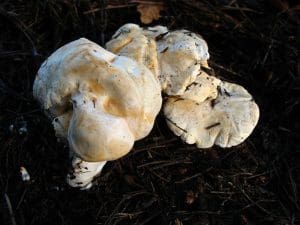
Stem:
A short, stout stem, roughly the same colour as the cap.
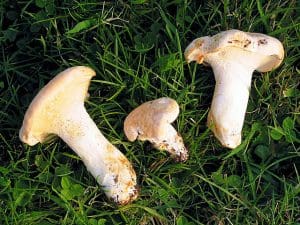
Gills:
Rather than gills they have teeth or spines that are easily detached from the flesh. They are slightly decurrent and are a similar colour to the cap.
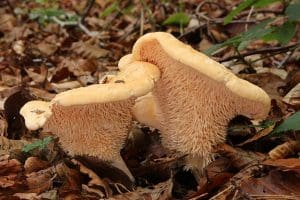
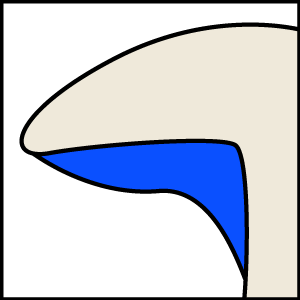
Smell:
Mushroomy and a little dry smelling.
Spores:
White
Uses
In food
An excellent gourmet mushroom, it’s sweet and nutty and they store well in the fridge for up to three weeks. The firm flesh makes them a good meat alternative. I like them marinated in soy sauce and honey and then grilled until caramelised.
They are commonly sold across Europe normally as Pied-de-Mouton (sheep’s foot).
The hedgehog mushroom makes a fantastic meat or chicken substitute as it absorbs flavour really well and has a texture that is a little more firm than your standard mushrooms.
Harvesting
The younger caps are best as they can get slightly bitter-tasting with age. This can be removed if you boil them for a few minutes before frying them.
A weird thing that happens if you’re picking a lot of these is that your hands start to look like ou’ve smoked thousands of cigarettes, they start to dye the tips of your fingers slightly dirty orange.
They are generally free from maggots but are apparently loved but red squirrels.
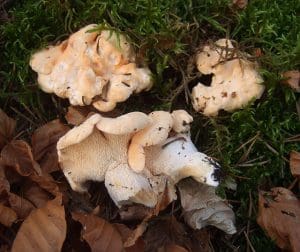
Known hazards
Studies conducted after the 1986 Chernobyl disaster showed that the fruit bodies have a high rate of accumulation of the radioactive isotope caesium but this should not be a concern for most people.
Potential lookalikes
The Terracotta Hedgehog, (Hydnum Rufescens) is a darker member of the same family and it’s also edible.
Growing on the forest floor with spines there is very little it can be mistaken for.



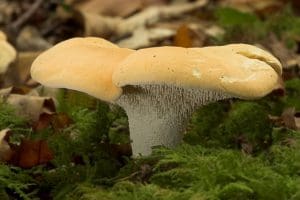



Leave a Reply
You must be logged in to post a comment.